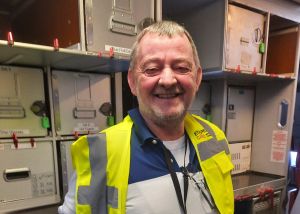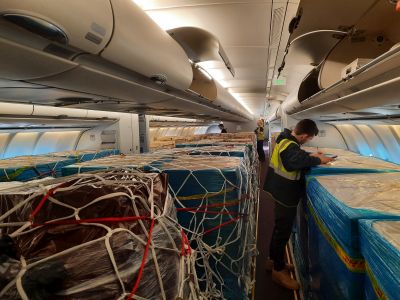Air, Feature, Freight News
Bournemouth Airport puts cargo first
[ April 12, 2022 // Chris ]Bournemouth Airport has launched a dedicated freight handling service, Cargo First. The south coast gateway describes itself as the fastest growing UK cargo hub based on 2020 statistics, having grown from almost no cargo in April 2020 to 20,000 tonnes of throughput by the end of March 2022. Indeed, it is on the verge of breaking into the UK’s top ten busiest cargo airports, it says.
Bournemouth Airport has been owned by Regional and City Airports (RCA), part of the Rigby Group, since 2017. The group also includes the airports at Exeter, Norwich and airport operations at Coventry and Solent, but Bournemouth probably has the most cargo potential, says chief executive, Andrew Bell.
It has two transit sheds of 20,000 and 30,000sq ft currently available but there is another 120,000sq ft shed on standby that could be brought into operation rapidly, says managing director Steve Gill.
In the immediate future, the airport is increasing its apron area to give it three positions for wide body aircraft, but it also has longer term plans to progressively develop the airport area to give an ultimate total of about 900,000sq ft for cargo, a scheme for which it has outline planning permission. Timeframe would be between now and 2030 “to meet all our aspirations” he says.
Of this, some 500,000sq ft could be brought into operation in a relatively short timeframe.
Development would be a mix of bespoke and speculative build and typical operators could be forwarding, logistics and e-commerce companies, he predicts.
Although the airport is surrounded by environmentally sensitive areas, all the development would be of existing areas.
At present, European Cargo accounts for virtually all Bournemouth’s current 20,000 tonnes a year cargo traffic, but RCA is in discussions with other operators. It sees its niche in the narrow body freighter segment, particularly e-commerce, which has grown very quickly since the Covid pandemic and shows no sign of abating.
There is also potential for perishables from Africa and elsewhere, says Gill. He adds that with Brexit imposing customs delays between the UK and other European countries, operators that would previously have flown all their cargo into a Continental European hub and trucked the UK portion from there may now be looking to fly directly into the UK in order to avoid delays.
As people start flying again, this will eat into the amount of bellyhold space available on scheduled passenger flights; at the same time, newer designs of plane on long haul routes such as the B787 have less cargo capacity. This will ensure that there is a market for a freighter-friendly airport, predicts Andrew Bell.
Bournemouth’s other strength is that it is the only airport in southern England open to flights 24 hours, which gives it an advantage even over the major hubs such as Heathrow, which are subject to night curfews. There is a noise quota, “but we are nowhere near filling it” says Steve Gill.
It can also offer features such as ‘truck to tail’ services – direct transfer between truck and aircraft on the tarmac – useful for urgent and sensitive cargoes.
Finally, says Andrew Bell, Bournemouth is significantly cheaper than the other major southern English airports for cargo operators.
Exports to the US are particularly strong, with Bournemouth-based European Cargo operating a fleet of freighter cargo aircraft. During the Covid-19 pandemic, it was also the import hub for millions of items of PPE and test kits.
European Cargo’s parent company, European Aviation, was founded in 1989 by chairman and chief executive, Paul Stoddart (pictured, below), started out in aircraft maintenance before setting up a passenger operation. Then, with the pandemic, it swiftly moved into freighter operator to cope with the urgent need for medical material, introducing a fleet of converted A340 aircraft.
European Cargo currently has six A340 converted freighters based at Bournemouth, with another due to join the fleet in April but ultimately will have a total of 17 A340s.
The carrier has transported 1.4 billion pieces of PPE for the NHS and is now developing its e-commerce and other business.
With its origins in aerospace, European Aviation has carried out the freighter conversion work itself, and it can also perform all but the very heaviest maintenance itself at Bournemouth.
European Cargo uses a rolling ‘pod’ system on the upper deck of its A340s, to supermarket roll cages. It can carry 46 pods, together with pallets and ULD containers on the lower deck, allowing a complete aircraft to be unloaded within two hours – and without having to cut a large cargo door into the converted aircraft.
European Cargo has recruited a team of people, boosting its staff strength from 140 to 406 and the carrier is developing new business, much of it e-commerce related. It has a regular contract with an express integrator to fly from Bournemouth to New York JFK.
It is also operating flights three times a week from China to JFK and it also flies three times a week from to Los Angeles.


Tags: Aviacargo; European Cargo; Bournemouth Airport, Regional and City Airports










